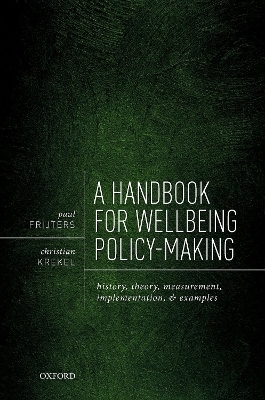
A Handbook for Wellbeing Policy-Making
Oxford University Press (Verlag)
978-0-19-289680-3 (ISBN)
This is an open access title. It is available to read and download as a free PDF version on the Oxford Academic platform. It is made available under a Creative Commons Attribution-Non Commercial-No Derivatives 4.0 International licence.
Around the world, governments are starting to directly measure the subjective wellbeing of their citizens and to use it for policy evaluation and appraisal. What would happen if a country were to move from using GDP to using subjective wellbeing as the primary metric for measuring economic and societal progress? Would policy priorities change? Would we continue to care about economic growth? What role would different government institutions play in such a scenario? And, most importantly, how could this be implemented in daily practice, for example in policy evaluations and appraisals of government analysts, or in political agenda-setting at the top level?
This volume provides answers to these questions from a conceptual to technical level, by showing how direct measures of subjective wellbeing can be used for policy evaluation and appraisal, either complementary in the short-run or even entirely in the long-run. It gives a brief history of the idea that governments should care about the happiness of their citizens, provides theories, makes suggestions for direct measurement, derives technical standards and makes suggestions on how to conduct wellbeing cost-effectiveness and cost-benefit analyses, and gives examples of how real-world policy evaluations and appraisals would change if they were based on subjective wellbeing. In doing so, it serves the growing interest of governments as well as non-governmental and international organisations in how to put subjective wellbeing metrics into policy practice.
Paul Frijters is Professor of Wellbeing Economics at the London School of Economics. From 2016 to 2019 he was at the Center for Economic Performance and thereafter at the Department of Social Policy. He completed his Masters in Econometrics at the University of Groningen and his PhD in Economics at the University of Amsterdam. He has taught at the University of Melbourne, the Australian National University, the University of Queensland, and the LSE. Professor Frijters specializes in applied microeconometrics, including labour, health, and happiness economics and has published over 150 refereed journal articles. In 2009, he was voted Australia's best young economist under the age of 40 by the Australian Economic Society. Christian Krekel is Assistant Professor in Behavioural Science in the Department of Psychological and Behavioural Science at the London School of Economics. He is also a Research Associate at the Centre for Economic Performance and at the Wellbeing Research Centre at the University of Oxford. Dr Krekel is an applied economist and his research fields include behavioural economics and wellbeing, policy and programme evaluation, and applied panel and spatial analysis. He obtained his PhD in Economics from the Paris School of Economics. He was awarded the Young Economist Award by the European Economic Association.
Richard Layard: Foreword
Preface
1: The Case for Wellbeing as the Goal of Government in the Context of Constraints on Policy-making
2: Wellbeing Measurement and Policy Design Measures, Key Findings, and Wellbeing Frameworks
3: Wellbeing Policy Evaluation and Appraisal: Data, Methods, Literature, Rules-of-thumb, and Technical Standards
Appendix A. Data: General Overview
Appendix B. Data: Technical Details
Appendix C. Data: Download Links and Sample Studies
Appendix D. Conversion between Different Scales and Indicators of Wellbeing
Appendix E. Headline Cost-effectiveness Graph and Justification of the Elements
4: Wellbeing Cost-effectiveness Analysis and Existing Approaches
Appendix. The Monetary Value of Wellbeing in Mathematical Notation
5: Applying Wellbeing Insights to Existing Policy Evaluations and Appraisals
| Erscheinungsdatum | 28.07.2021 |
|---|---|
| Zusatzinfo | 37 Figures, 31 Tables |
| Verlagsort | Oxford |
| Sprache | englisch |
| Maße | 163 x 141 mm |
| Gewicht | 846 g |
| Themenwelt | Medizin / Pharmazie ► Gesundheitswesen |
| Wirtschaft ► Volkswirtschaftslehre ► Wirtschaftspolitik | |
| ISBN-10 | 0-19-289680-6 / 0192896806 |
| ISBN-13 | 978-0-19-289680-3 / 9780192896803 |
| Zustand | Neuware |
| Haben Sie eine Frage zum Produkt? |
aus dem Bereich


